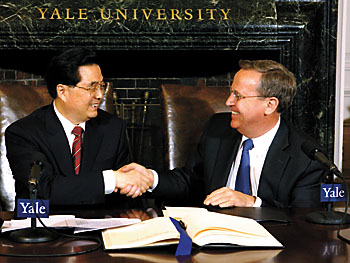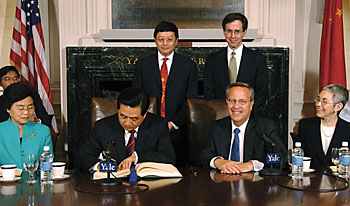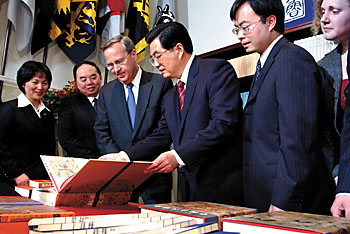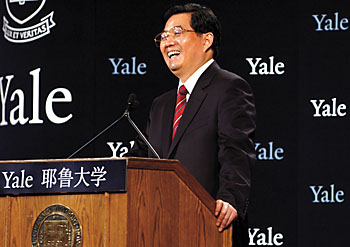 | President Hu Jintao of China and President Richard C. Levin both said that cultural and education exchanges among young people are key to developing stronger ties between Yale and China. |
Looking out at the young faces in the audience gathered in Sprague Memorial Hall for his lecture on April 21, Chinese President Hu Jintao said, "If time could go back several decades, I would really like to be a student of Yale just like you."
Hu's declaration -- echoing as it did the ambition of Yale's first Chinese graduate, Yung Wing, over 150 years ago -- was an affirmation of the close academic ties that flourished since then between Yale and China. Hu's visit to the University, the first by any president of China, was indicative of the ways that those ties are continuing to strengthen and expand.
The Yale campus was the final stop on Hu's trip to the United States, his first since becoming president of the People's Republic of China. Hu had earlier visited Seattle, where he toured Microsoft headquarters with founder Bill Gates, and Washington, D.C., where he met with President George W. Bush.
A 55-car motorcade brought the Chinese delegation from Bradley International Airport to campus. Because of security concerns, the area around Sprague and Woodbridge Halls had been closed off, but crowds of people bearing banners of both welcome and protest lined the perimeter. Supporters and detractors had also gathered on the New Haven Green and on Old Campus, which was opened to student protesters for the first time in Yale's history.
The Chinese officials were formally welcomed to the University by President Richard C. Levin and the Yale delegation at a ceremony held in Woodbridge Hall's Corporation Room, so named because that's where the University's trustees meet. (See "A Meeting of Delegations".)
After a brief private meeting, Levin and Hu took part in a formal gift-exchange ceremony, where the memory of Yung Wing was also evoked.
Levin presented Hu with a portrait of Yung Wing, who became the first Chinese citizen to earn a degree from a North American university when he graduated from Yale in 1854, as well as a book once owned by the historic alumnus. Yung Wing, after returning to his homeland, launched a program to send other young Chinese to Yale and other U.S. colleges of higher education, and he was one of the first Chinese diplomats to the United States. In 1878, the alumnus gave his personal book collection of 1,280 volumes to the University for its East Asia Library. That collection has now grown to over 700,000 volumes and is considered one of the finest outside of China.
The book that Levin presented to Hu, part of Yung Wing's original gift, was a compilation of Confucian teachings, representative both of the types of volumes common in the alumnus' lifetime and of those now held by Yale. In presenting the gift, Levin hailed the academic ties that have brought over 4,000 Chinese students to Yale to study, as well as the current and emerging library collaborations between the University and China. The latter include a new program of librarian internships with the People's Republic of China, which has already brought the first two Librarian Fellows from Sun Yat-sen University to the Yale University Library, as well as a new project for the organization and partial digitization of a special East Asia Library collection containing Chinese historical documents.
Levin also presented Hu with a collection of the six volumes published jointly during the last decade by the Yale University Press and the China International Publishing Group as part of a collaboration by scholars from China and around the world to publish works in both Chinese and English about major aspects of Chinese culture and civilization. The publications to date are devoted to Chinese architecture, sculpture, society and politics, archaeology, philosophy and painting.
Following the gift-exchange ceremony, the Yale and Chinese representatives went to Sprague Hall, where an audience of Yale faculty, students and other invited guests had gathered to hear an address by Hu.
While waiting for the Chinese president's arrival, the audience had been treated to a concert of music by students from the School of Music. It included performances by Mingzhu Wang, a first-year Master of Music (M.M.) student, on flute; Romie DeGuise-Langlois, a second-year M.M. student, on clarinet; Wayne Lin, a third-year Artist Diploma student, on violin; and Scott Borg, a second-year Artist Diploma student, and Matthew Rohde, a Yale College senior in the B.A./M.M. program at the School of Music, on guitar. The program concluded with traditional Chinese folksongs, performed by Jie Gong, a first-year composition student.
The Sprague Hall address was history making on several fronts. It was the first speech by a Chinese head-of-state ever broadcast live back to China; it was also the first speech at Yale to be web-streamed live campus-wide. (A web-stream of the event is still available at www.yale.edu/opa.) The event was also broadcast live on the Yale Cable service, both in English and in Chinese, and the English version was cablecast by Citizens Television and Comcast of New Haven. Members of the audience in Sprague Hall were able to listen to Chinese or English versions of Levin's and Hu's remarks via special headphones.
In his introductory remarks, Levin praised China's "ancient tradition of reverence for education," adding: "During the past decade, you have made massive investments in your universities, strengthening the most excellent of those institutions while broadening access to higher education from less than 5% to more than 15% of your college-age population.
"Your nation's focus on education has contributed substantially to your historically unprecedented success in lifting more than 200 million of your citizens out of poverty in the past quarter-century. We admire these achievements, and, like most Americans, we are hopeful that the development of your economy will be accompanied by continued expansion of the rule of law and strengthening the rights of individuals."
The conversations that have taken place in recent years between Yale officials and leaders of Chinese universities have revealed "deep differences on important questions of values and national policy," noted Levin. "But we also share values in common, chief among them the belief that only through education can one acquire the capacity to think creatively and independently, and thus contribute to scientific and material progress as well as to the humanistic and artistic expression that enriches society.
"We also agree on the power of personal encounter to deepen mutual understanding among those who start from different traditions, norms and values," said Levin. "Our experience mirrors that of thousands of U.S. and Chinese scientists and scholars and tens of thousands of students whose interactions with one another can be a foundation for a lasting peace between our nations." (The complete text of Levin's address can be found at www.yale.edu/opa.)
In his speech, Hu also hailed the importance of the ties between Yale and China, noting, "Yale's motto 'Light and Truth,' which is a calling for human progress, represents the aspiration of every motivated young man and woman. ... The words of Nathan Hale, an American hero and Yale alumnus, 'I only regret that I have but one life to lose for my country,' have also inspired me and many other Chinese."
Hu went on to discuss recent strides that China has made both economically and socially. He noted with pride that China's Gross Domestic Product (GDP) grew from $147.3 billion in 1978 to $2.2257 trillion in 2005, but pointed out that "despite the success in its development, China remains the world's largest developing country, with per capita GDP ranking behind the 100th place. The Chinese people are yet to live a well-off life and China still faces daunting challenges in its development endeavor."
Over the next 15 years, Hu said, China will pursue a "scientific outlook on development that makes economic and social development people-oriented, comprehensive, balanced and sustainable."
Hu stressed that "putting people first" is an especially important component of this approach, saying, "Nothing is more valuable in the universe than human beings. ... We will vigorously promote social and economic development, protect people's freedom, democracy and human rights according to law, achieve social fairness and justice and enable the 1.3 billion Chinese people to live a happy life."
Regarding his nation's international relations, Hu told the audience: "Today, China holds high the banner of peace, development and cooperation. ... It genuinely wishes to enter into extensive cooperation with other countries. It is inclusive and is eager to draw on the strength of other civilizations to pursue peace and development through cooperation and play its part in building a harmonious world of enduring peace and common prosperity."
Noting that United States and China both have vast territories and diverse cultures within their borders, Hu said: "Closer China-U.S. cooperation serves the fundamental interests of our two countries and peoples and is also of far-reaching significance for peace and development of the whole world. ... Global peace and security now face new challenges, such as fighting international terrorism, preventing the proliferation of weapons of mass destruction, protecting the environment and human habitat and combating transnational crimes. And it is exactly in these fields that we share important strategic interests. ... I am confident that our relations will move ahead in a healthy and steady manner, and contribute to the well-being of our two peoples and bring greater hope to people around the world."
Describing cultural diversity as "an important driving force for human progress," Hu said, "As history has shown, in the course of interactions between civilizations, we not only need to remove natural barriers and overcome physical isolation, we also need to remove obstacles and obstructions of the mind and overcome various prejudices and misunderstandings. ... Exchanges in culture and education and among young people serve as a bridge for increasing mutual understanding between our two peoples. They are also a major driving force for the healthy and stable growth of China-U.S. relations. Yale is a forerunner in conducting China-U.S. educational exchanges and provides an important platform for cultural exchanges between our two countries."
Yale has accepted over 4,000 Chinese students in the past 20 years, noted Hu, and now has more than 80 joint projects with China in culture, science and technology, and education. "Last summer," he said, "Yale sent the first group of students to China for internships and some among them became the first foreign interns to work with China's Palace Museum. ...
"To enhance mutual understanding between young people and educators of the two countries," continued Hu, "I announce with pleasure here that we have decided to invite 100 Yale faculty members and students to visit China this summer. I'm sure you can look forward to an enjoyable experience in China." (Details of the summer program will be finalized in the upcoming weeks.)
Hu concluded by quoting the old Chinese saying: "As in the Yangtze River where the waves behind drive on those before, so a new generation always excels the last one."
He added: "Young people represent the hope and future of the world. They are full of vitality, new ideas and creativity. I sincerely hope that the young people in China and the United States will join hands and work to enhance friendship between our two peoples, and, together with people of other countries, create a better world for all." (The full text of the Chinese president's speech is available at www.yale.edu/opa.)
Prior to the address, members of the Sprague Hall audience had been invited to submit questions for Hu. These were presented by Ernesto Zedillo, director of the Yale Center for the Study of Globalization and former president of Mexico. Due to time constraints, Zedillo only had time to pose two questions -- which, he said, reflected common topics raised by audience members.
Noting that there is "much discussion and little agreement" in the United States as to whether China represents a "threat" or an "opportunity," Zedillo asked: "Is there agreement in your government, Mr. President, about what the U.S. represents for China?"
Hu replied, in part: "Both China and the United States have come to be of significant influence in today's world, and both countries shoulder important responsibilities for world peace and common development. ... Our two countries should not only be stakeholders, all the more, we should become parties of constructive cooperation.
"I'm sure this view of mine will certainly win the support and endorsement of the Chinese people."
In posting his second question, Zedillo began by noting the rapid economic growth that China has experienced over the past quarter century due to economic freedoms by reforms initiated by the nation's leaders in 1978. He added: "There is always the question of whether or not, a system that allows economic freedom while restricting political freedom will encounter serious problems of social unrest in the long run. Is this a concern for the Chinese government? Does the Chinese leadership have a strategy to enhance civil liberties and religious freedom in China?"
In his response, Hu said he didn't believe it was fair to say that China's recent achievements are due merely to economic reform, noting that the nation has also seen political, cultural and other changes.
China's "sustained and rapid" economic development, he declared, "in itself has demonstrated the fact that China's political system suits its economic development.
"In the future," Hu said, "we will continue to make efforts in the light of China's national traditions and the will of the Chinese people to actively, prudently and appropriately move forward the political restructuring and develop a socialist democracy.
"In the future we will make efforts to further enrich the formats of democracy and expand the orderly participation in the political field by our Chinese citizens, and we are also going to further implement the strategy of running the country according to law. We will continue our efforts to ensure that the Chinese people better exercise their rights of democratic election, democratic decision-making, democratic management and democratic supervision as provided for in the law."
However, Hu concluded, while China may learn from observing other countries' political development, "[W]e will not simply copy the political models of other countries."
At the conclusion of the question-and-answer session, the motorcade bearing Hu and the other Chinese delegates whisked off to begin the journey home.
Later that day, Yale faculty offered their thoughts on Hu's remarks at a panel discussion titled "China Today." See below for a story on that event.
-- By LuAnn Bishop
T H I S
President of China Visits Yale

President Hu Jintao signs the guest book at the formal welcoming ceremony in Woodbridge Hall. Sitting beside him and President Richard C. Levin are their wives Liu Yongqing and Jane Levin. Standing behind Hu and Levin are Yale genetics professor Tian Xu and Paul Gewirtz, director of Yale's China Law Center.
An exchange of gifts

Levin and Hu examine one of the 1,346 volumes that the Chinese leader presented to Yale for use by its faculty and students. Looking on are (from left) Fawn Wang, assistant University secretary for international affairs; Zhou Ji, China's minister of education; Fox Fellow Guoyou Song; and Jessica Leight, a Yale College senior majoring in economics who will be visiting China this summer.
In a gesture that echoed Yung Wing's gift, Hu presented Yale with 1,346 volumes in both Chinese and English to benefit the University's students and faculty. The gift from China includes titles in a range of disciplines in the humanities and social sciences, and together they comprise a comprehensive and systematic introduction to Chinese scholarship and learning. The Yale University Librarian for the Chinese Collection, Chi-wah Chan, in his initial perusal of the books said, "This gift will add important volumes to our East Asia Library, and I am particularly delighted by the many ways it will fill in gaps in our contemporary holdings."
Sprague Hall speech

Hu laughs at Ernesto Zedillo's suggestion that the Chinese leader would make a great Yale professor.
Questions from the audience
 W E E K ' S
W E E K ' S S T O R I E S
S T O R I E S![]()
 Blocker returning to Yale to lead School of Music
Blocker returning to Yale to lead School of Music![]()
![]()
 Yale historian receives special Pulitzer citation
Yale historian receives special Pulitzer citation![]()
![]()
 YCIAS officially renamed as MacMillan Center
YCIAS officially renamed as MacMillan Center![]()
![]()
 New program offers employees back-up child care
New program offers employees back-up child care![]()
![]()
 President of China Visits Yale
President of China Visits Yale
![]()
 Campus will welcome 18 new Yale World Fellows this fall
Campus will welcome 18 new Yale World Fellows this fall![]()
![]()
 FACULTY HONORED
FACULTY HONORED
 Eight faculty elected to American Academy of Arts and Sciences
Eight faculty elected to American Academy of Arts and Sciences![]()
 Theoretical physicist Girvin named to National Academy of Sciences
Theoretical physicist Girvin named to National Academy of Sciences![]()
 Bresnick is new member of American Academy of Arts and Letters
Bresnick is new member of American Academy of Arts and Letters![]()
 Alexander, Galvani and Valis . . . winners of Guggenheim Fellowships
Alexander, Galvani and Valis . . . winners of Guggenheim Fellowships![]()
 Historian Amanat selected as Carnegie Scholar
Historian Amanat selected as Carnegie Scholar![]()
![]()
 Former airline official to lead Yale's labor-management initiatives
Former airline official to lead Yale's labor-management initiatives![]()
![]()
 Yale students reduce their energy use by 10%
Yale students reduce their energy use by 10% ![]()
![]()
 Anatomy lessons: Faculty testing new method of teaching medical students
Anatomy lessons: Faculty testing new method of teaching medical students![]()
![]()
 'Silent Spring' author is focus of Beinecke Library exhibit
'Silent Spring' author is focus of Beinecke Library exhibit![]()
![]()
 Inaugural play festival features new works by Drama School students
Inaugural play festival features new works by Drama School students![]()
![]()
 Three students win Morris K. Udall Scholarships . . .
Three students win Morris K. Udall Scholarships . . .![]()
![]()
 Joint library project to preserve historic sound recordings . . .
Joint library project to preserve historic sound recordings . . .![]()
![]()
 Yale Press and Yale Rep launch major competition for new dramatic works
Yale Press and Yale Rep launch major competition for new dramatic works![]()
![]()
 Study to explore lasting effects of early health habits
Study to explore lasting effects of early health habits![]()
![]()
 Fund and lecture named for noted neurologist
Fund and lecture named for noted neurologist![]()
![]()
 In Memoriam: Dr. Thomas T. Amatruda Jr.
In Memoriam: Dr. Thomas T. Amatruda Jr.![]()
![]()
 Yale Dramat's 'Side Show' tells true tale of vaudeville stars . . .
Yale Dramat's 'Side Show' tells true tale of vaudeville stars . . .![]()
![]()
 Weiswasser Lecture will explore HIV prevention in teens
Weiswasser Lecture will explore HIV prevention in teens![]()
![]()
 Student Research Day will feature Farr Lecture and . . . presentations
Student Research Day will feature Farr Lecture and . . . presentations![]()
![]()
 Symposium will explore advances in chemistry and biology
Symposium will explore advances in chemistry and biology![]()
![]()
 Yale College juniors honored by Council of Masters
Yale College juniors honored by Council of Masters![]()
![]()
 Learning the art of wrong thinking
Learning the art of wrong thinking![]()
![]()
 New memorial lectureship at Cancer Center honors Dr. Paul Calebresi . . .
New memorial lectureship at Cancer Center honors Dr. Paul Calebresi . . .![]()
![]()
 In service to the community
In service to the community![]()
![]()
 Campus Notes
Campus Notes![]()
Bulletin Home |
| Visiting on Campus
Visiting on Campus |
| Calendar of Events
Calendar of Events |
| In the News
In the News![]()
Bulletin Board |
| Classified Ads
Classified Ads |
| Search Archives
Search Archives |
| Deadlines
Deadlines![]()
Bulletin Staff |
| Public Affairs
Public Affairs |
| News Releases
News Releases |
| E-Mail Us
E-Mail Us |
| Yale Home
Yale Home